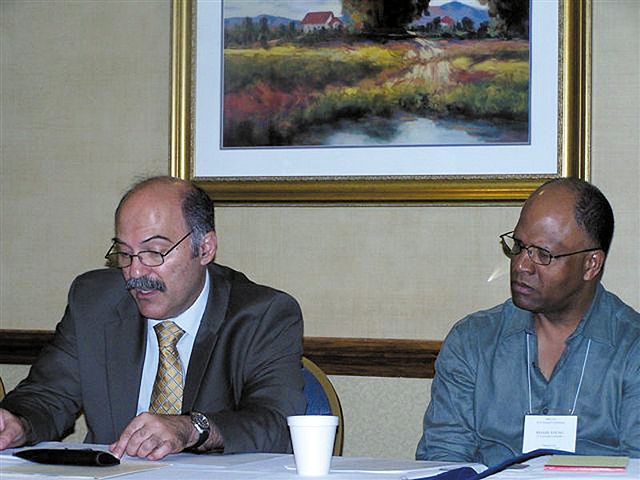Staff Report

Prof. Barlow Der Mugrdechian of the Armenian Studies Program at Fresno State participated in the 21st Annual Society for the Study of the Multi-Ethnic Literature of the United States (MELUS) conference, held the weekend of March 22-25. The theme of the conference was “Work, Migration, and Globalization: Contested Journeys in Multi-Ethnic U.S. Literature.”
Der Mugrdechian participated in a panel on “Recovering Identity,” with a paper on “William Saroyan: Discovering Meaning Out of Dislocation and Exile.” Dr. James Walton, Chair of the Department of English at Fresno State chaired the panel, which also included papers by Adam Lewis (UC San Diego) “James Weldon Johnson and the Work of Representative Identity at Home and Abroad” and Reggie Young (University of Louisiana at Lafayette) “The People on Board ‘Tis the Old Ship of Zion”: Ritual Revival, Reconciliation, and Resurrection in James Baldwin’s ‘Sonny’s Blues.'”
Der Mugrdechian’s paper explored the theme of dislocation and exile, and how Saroyan treated this theme in some of his works. In particular Der Mugrdechian discussed the short story “Countrymen, How Do You Like America?” This story centers around Sarkis of Gultik, an Armenian peasant who has immigrated to the United States. Sarkis faces the same challenges that nearly all immigrants have-establishing a sense of place and home, in contrast to the loneliness and separation that they feel. Sarkis finds work but is still constantly lonely. He looks for a wife, and ultimately marries, and finally moves to California. Though he eventually becomes financially self-sufficient, material success does not heal his pain, and Sarkis ponders the deeper meaning of life. Sarkis thinks about his old life, where he may have been impoverished, but where he had family and friends. The ending of the story is inconclusive, but leaves the reader with a feeling that life has many surprises in store.
Saroyan authentically portrays Sarkis’ intense feelings, since he himself had had a similar experience growing up in Fresno, without his father, who had died at an early age. Saroyan wants to make sense out of his world-to bring order to a fragmented world. And Saroyan often utilized humor to illustrate his points.
Saroyan’s play, “My Heart is in the Highlands,” published initially as a short story, also touches upon the feelings of longing permeating a small family in Fresno, California. It is through art that Saroyan brings meaning to his characters, one of whom is a poet, the other a musician. The “Highlands” of the title are a reference to Armenia, a country which is in mountainous highland plateau. This search for healing and meaning through art is, Der Mugrdechian argues, the hallmark of Saroyan’s work, his use of art as a bridge for people to make sense of their worlds.
Luis Valdez, a central San Joaquin Valley native who is widely considered the godfather of Chicano theater, was the conference’s keynote speaker. Valdez is the celebrated playwright and film director of “Zoot Suit” and “La Bamba.”
California was the site of the first MELUS conference in 1987, and MELUS returned to California for its twenty-first conference. Several hundred scholars from throughout the world, and from as far away as Finland, Brazil, and Taiwan participated. Students also participated in and attended the conference.
The MELUS conference was held at the Picadilly Inn-University Hotel and at California State University, Fresno and was organized by the Department of English and the Department of Modern and Classical Languages and Literatures.
 Hye Sharzhoom Armenian Action
Hye Sharzhoom Armenian Action